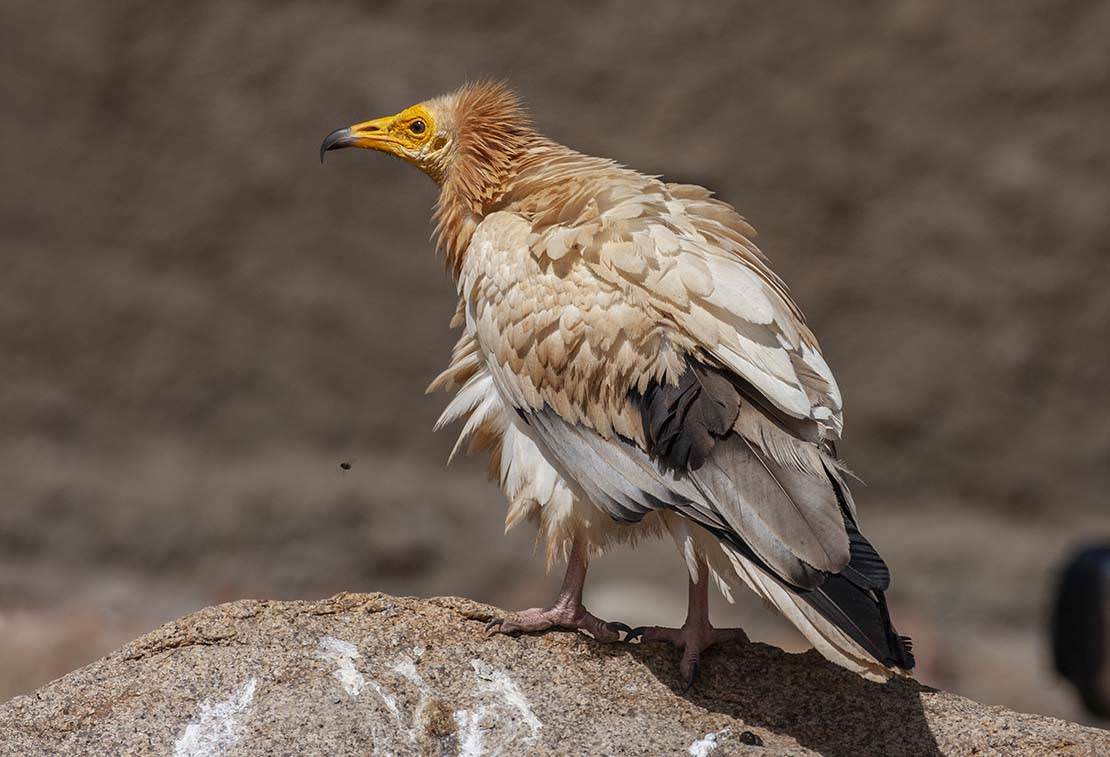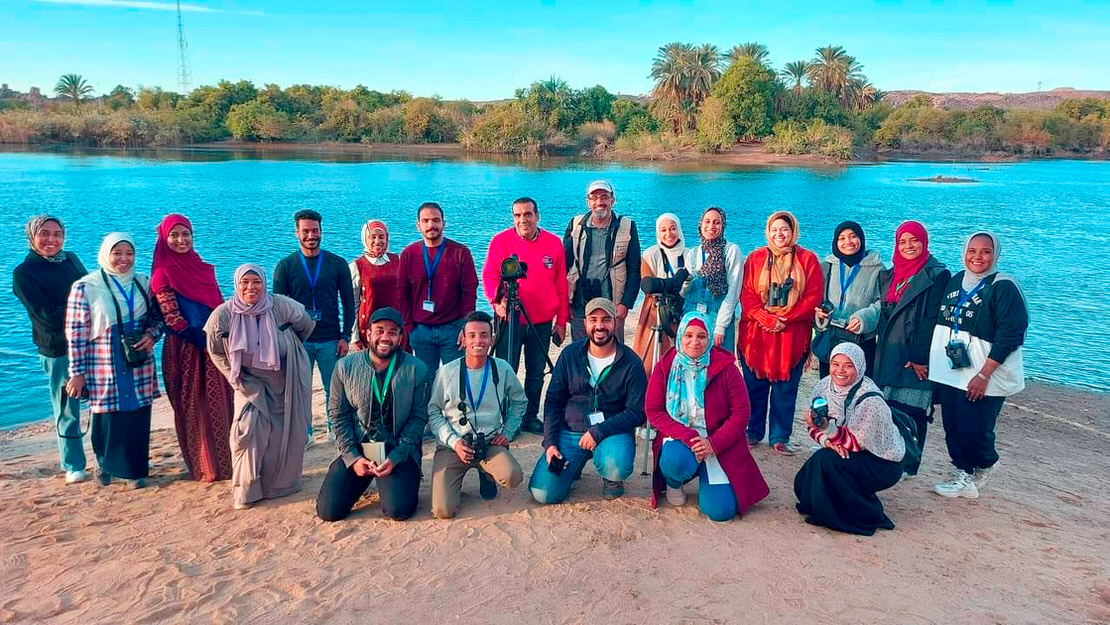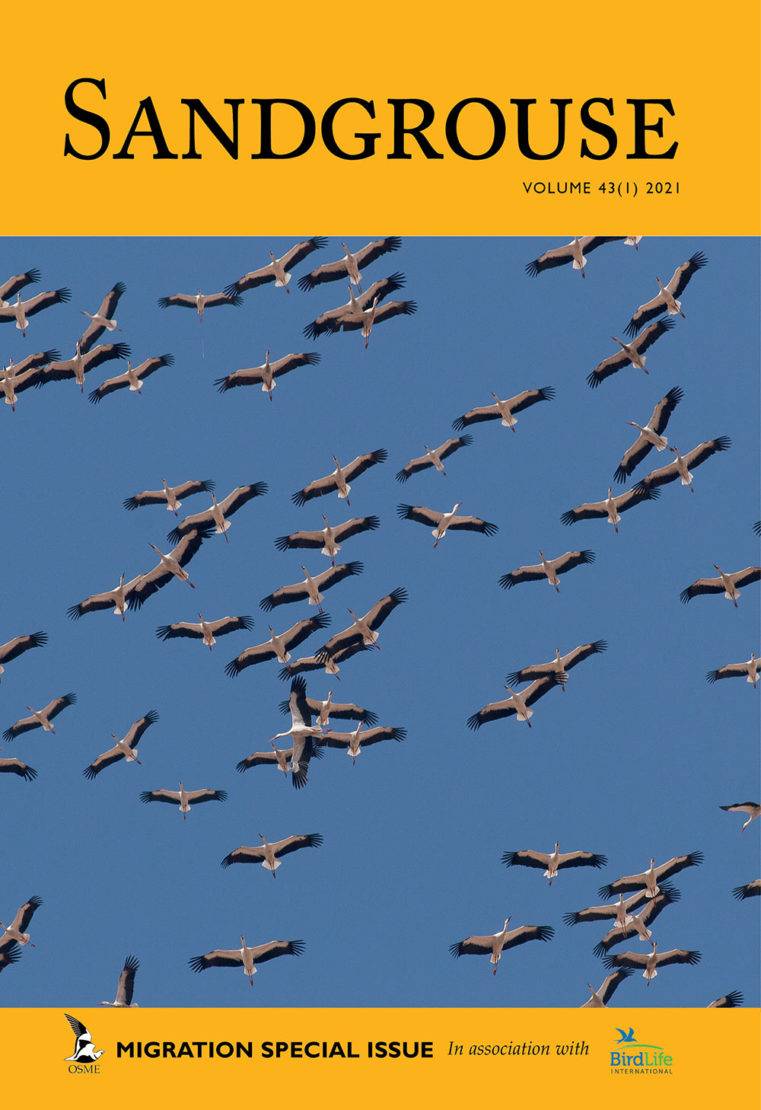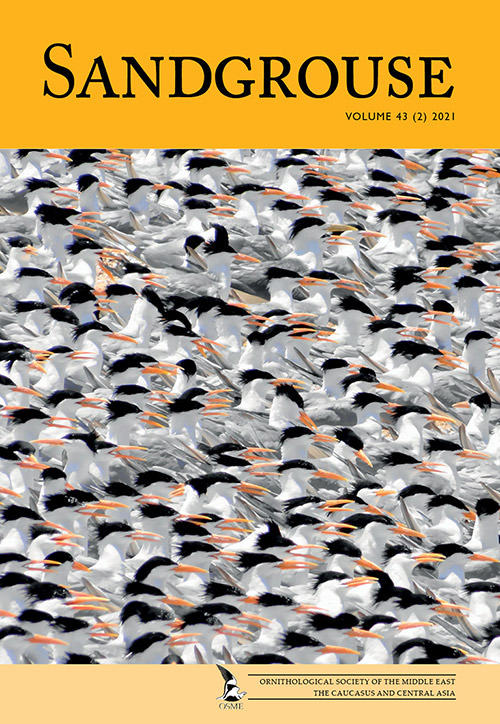Despite the ongoing global pandemic, 2021 was another very successful year for OSME with continued growth in our conservation work across the region. It was yet another exceptional year for our small grants programmes. In January we awarded our second grant through the Trevor Poyser Species Conservation Fund to the Association for Bird Conservation in Lebanon (ABCL) for a project on the globally Vulnerable Syrian Serin Serinus syriacus. The project will involve a survey of breeding birds in Lebanon and an assessment of threats that will enable the development of an updated national, and potentially international, species action plan. We were also delighted to receive a further £10k from the estate of Trevor Poyser that will enable this fund to continue for at least another two years. Our flagship Conservation Fund had yet another record-breaking year with £22,925 awarded to nine projects during 2021:
- Batumi Raptor monitoring 2021 (Georgia: £2950)
- Determining and updating the status of owls in Jordan (Jordan: £2900)
- Decreasing mortality rate of Egyptian Vultures during migration in Turkey (Turkey: £3500)
- Identifying migration routes and wintering sites of Egyptian Vultures breeding in Uzbekistan (Uzbekistan: £3000)
- Local stewardship for Eastern Imperial Eagles of Thrace (Turkey: £2500)
- Conservation of the western population of the Great Bustard in Turkey (Turkey: £2000)
- Monitoring and advocating for key steppe birds in Kyrgyzstan’s Tulek Valley IBA (Kyrgyzstan: £2575)
- Annual monitoring of Sociable Lapwing migration through Kumo-Manych depression (Russian Federation: £1000)
- A study of Snowfinches for mountain conservation in the Greater Caucasus (Georgia: £2500)
This continued growth in our expenditure is partly due to the ongoing financial support we receive from the March Conservation Fund of the Tides Foundation, as well as increasing donations from our members and supporters. We were pleased that in 2021 we were able to collaborate with Birds on the Brink to co-fund the Egyptian Vulture in Turkey, and are keen to develop similar joint funding initiatives in the future. There are now just three countries across our region yet to receive a grant through the OSME Conservation Fund: Kuwait, Qatar and Turkmenistan. We are actively looking to support projects in these countries. Huge thanks go to our independent committee for reviewing all project applications and making recommendations to OSME Council. Throughout 2021 the committee was chaired by Dr Maxim Koshkin with expert input from Dr Nabegh Ghazal Asswad, Sharif Jbour, Richard Porter, Hana Raza and Maïa Sarrouf Willson. After many years of advice and support Richard Porter stepped down at the end of 2021 and we welcomed Dr Alyona Koshkina to the Conservation Fund committee.

Work on the globally Endangered Egyptian Vulture Neophron percnopterus was supported by two Conservation Fund projects awarded in 2021.
Our Youth Development Fund launched in 2019 continued to develop existing projects as well as initiate new ones. This work is co-ordinated by Tomas Haraldsson, OSME’s Youth Development Officer. Many of the projects rely on physically getting together at ‘bird camps’ often with the support of international experts, and this approach has had to adapt since the start of the pandemic. It is impressive to see several projects continuing under local leadership, which in itself is a key aim of our youth development work. Fauna & Flora International (FFI) in Georgia received a follow up grant to fund their important work with young falconers to help shift the local interest away from unsustainable (and illegal) trapping/hunting to conservation of raptors in Georgia. Co-leader of the project is OSME supported member Aslan Bolkvadze. The group visited raptor sites, wetlands and villages and learnt about raptor identification, conservation and what local practises that might be harmful to nature. A short video on the OSME YouTube channel outlines the project. A long-planned bird camp in Cyprus, hosted by Kuskor and supported by three young birdwatchers from BirdLife Sweden, took place in October 2021. The weekend saw the group participate in bird ringing (and handle an endemic Cyprus Scops Owl!), learn about monitoring seabirds on islands by boat and exchange ideas and views about important conservation issues. Another bird camp that has taken several years to get off the ground was held in Aswan, Egypt in December. Aswan is the main city in southern Egypt, adjacent to the river Nile and next to important bird areas such as Lake Nasser and the lagoons and wetlands of the Nile Valley. Local young birdwatchers, an ecotourism enterprise and the national BirdLife partner Nature Conservation Egypt (NCE) teamed up and held an excellent weekend of training and awareness raising activities. Our expenditure via the Youth Development Fund exceeded £5000 and it is pleasing to see a number of donations being specifically made to support this area of OSME’s work.

Two bumper issues of our highly respected journal Sandgrouse were published totalling 340 pages. The spring issue was themed around bird migration in the OSME region and included a review of migratory soaring bird monitoring in the East African-Eurasian flyway. The paper highlighted the excellent long-term monitoring at the Batumi bottleneck in Georgia, a hugely important project that needs ongoing support, and which OSME are proud to have helped over the years. It was also pleasing to see several projects funded by OSME’s Conservation Fund publishing their papers in Sandgrouse, including the status of Golden Eagles in Oman, White-headed Ducks in Turkey and Sociable Lapwings in south-west Russia. Our digital version of Sandgrouse continues to attract more subscribers with more than 50 members opting for this version saving approximately £600 a year in postage costs. A further 80 members have opted to receive both the digital and printed version. It has been particularly attractive to those in countries with disrupted postal services. Any members wishing to receive a digital version of Sandgrouse should email: sandgrousedigital@osme.org


In 2020 we moved all of our meetings to an online format and this approach continued throughout 2021 with our Summer Meeting and AGM both held using Zoom. Due to the popularity of the online meetings, enabling members and supporters from across the OSME region to participate, we also held our first online Winter Meeting. One of the key advantages of moving meetings online is the ability to attract speakers from across the region to share their research and conservation work. The two online meetings in 2021 included speakers from Egypt, Iraq, Oman, Syria, Turkey and Uzbekistan; such a diversity of contributors (and participants) would not be possible if the meetings were face-to-face. All the presentations from the online meetings are available on the OSME YouTube channel. A massive thank you to the British Trust for Ornithology (BTO) for allowing OSME to use their Zoom conferencing facilities. All Council meetings throughout 2021 were also held using Zoom and it is likely that this will remain the dominant format of meetings in the future.
A key development in 2021 was the launch of a new quarterly OSME e-newsletter with the first issue circulated to subscribers in February. The newsletter is free to both members and non-members and aims to provide project updates and news from across the OSME region. The newsletter is produced and edited by newly co-opted Council member (and long-standing OSME member) Phil Roberts and Georgia Locock. It is easy to subscribe and we’re happy to receive ideas and suggestions regarding content. By the end of 2021 the e-newsletter had almost 400 subscribers. The OSME Facebook page went from strength to strength and passed 4000 followers in December. During 2021 a significant amount of effort was put into developing more multi language content to reach a wider audience from across the region, and we now have guest co-editors sharing posts and updates in Arabic, Georgian, Turkish and Russian. We also invested in upgrading and updating our free Birds of the Middle East App which continues to be downloaded across the region (here and here).
Despite the upheaval created by the global pandemic, OSME’s finances remain robust and this is a reflection of the excellent stewardship of our accounts by John Warr and Chris Hughes (co-Treasurers). Our accounts were audited by Mike Jennings, approved by the AGM and submitted to the Charity Commission. All OSME Council members continue devote significant time and energy to the work of our small but effective charity. There is lots more that we can do to promote the joy of birds, birdwatching and conservation across the Middle East, the Caucasus and Central Asia – we are always looking for more members to join our Council – if you’d like to discuss how you can help us, then please contact me via email: chairman@osme.org We’re especially interested in hearing from people who have an interest in running and expanding our programme of online meetings.
Finally, a huge thank you to all OSME members, corporate sponsors and donors who have continued to support our activities, we couldn’t have achieved so much for the birds of the OSME region without you.
Dr Rob Sheldon, OSME Chairman, email: chairman@osme.org
